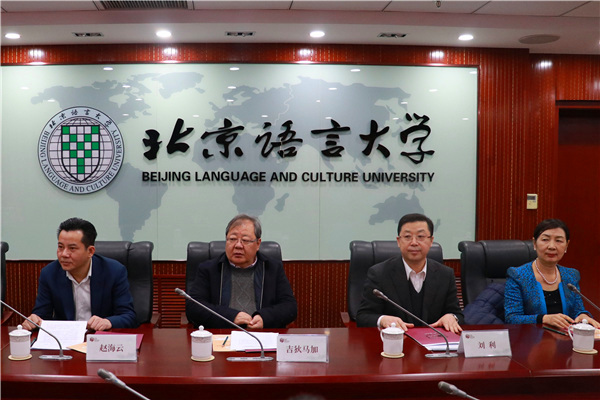Popularization of minority ethnic group literature discussed
- By Zhang Jiaqi
 0 Comment(s)
0 Comment(s) Print
Print E-mail China.org.cn, January 22, 2018
E-mail China.org.cn, January 22, 2018

At a time when Chinese literature and culture is going global, efforts should also be made to look inward at the diversity and complexity of the literature and culture contributed by those from the country's many minority ethnic groups.
This was one of the points that emerged from the Seminar on the Translation and Popularization of Multi-Ethnic Literature held at Beijing Language and Culture University (BLCU) on Jan. 20.
The event attracted nearly 30 experts, including writers of different ethnic groups, as well as professionals in literature, translation and publishing, to discuss the current status and development of such literature and the challenges involved in popularizing them in China and beyond.
The literature of the minority ethnic groups in China is an indispensable part of Chinese literature, adding more charm to the Chinese literature family, said Ye Mei, executive vice president of Chinese Minority Writers' Society and also a writer from the Tujia ethnic group.
Her comment on the role of the literature of minority ethnic groups evoked wide agreement among the seminar participants. Han Jinghui, a writer of the Mongolian ethnic group, also offered her elaboration on the importance of minority ethnic group literature drawing on her own writing experiences, saying minority ethnic group literature works based on real experiences reflect the life of minority ethnic groups, touch on the psychological changes they have undergone,and stand as an epitome of the historical changes of minority society.
Despite its widely-acknowledged importance, Xu Zhongzhi, deputy director of the management committee of China Writer Publishing Group, pointed to the unbalanced and insufficient publicity and popularization of minority ethnic group literature, thus demonstrating the significance of dialogue and discussion on this topic.
The discussion sponsored by Chinese Culture Translation & Studies Support Network (Sino-Foreign Cultural Translation and Cooperation Platform), Chinese Minority Writers' Society, Belt and Road Chinese Culture Education, the International Exchange Fund and BLCU, also featured the establishment of a bookshelf for minority ethnic group literature in the university and the launch of a "Communication Camp for Chinese and Foreign Writers".
The university will set up a special bookshelf for minority ethnic group literature to accommodate books donated by minority writers like Zhao Yanbiao, Xing An, Guan Shengli, Han Jinghui and Yang Yumei as well as minority ethnic group literature journals published in the languages of different ethnic groups in China.
Meanwhile, sinologists, translators, professors, writers, publishers and other related experts will be invited to the camp, where they will be encouraged to discover and create works on China, and also communicate and cooperate with Chinese writers and publishers on literature and culture.
According to Xu, as pioneering and innovative steps for minority ethnic group literature to go global, the bookshelf and the camp are moves to promote minority ethnic group literature domestically and abroad.
He said that the bookshelf should attract more readers in the country to get to know about the contributions and creativity of the literary cause, especially Chinese and international students studying at BLCU, a university which boasts the most international students in China.
The camp, meanwhile, will become a platform to promote Chinese and foreign communication in literature and culture, helping the outside world to know what life is like in China, and what the Chinese people are doing, and help to popularize Chinese literature and culture and contribute to more literary works.
"Literary works are the most efficient way to understand the spirit, life and thoughts of a nation," said Jidi Majia, vice president of Chinese Writers Association, emphasizing that different from media reports, literature is a more vivid choice in getting to know the country.






Go to Forum >>0 Comment(s)